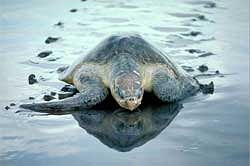
"We have found that the hatching of the eggs, which ended last week, have gone down by 40 to 50 per cent this year as the eggs, numbering thousands, got spoiled after the leaked oil soaked the nesting site on the beach," Rabindranath Sahu, secretary of the Rushikulya Sea Turtle Protection Committee, told reporters.
An oil coat had spread over a seven km area near the nesting site off the Rushikulya beach after around eight tonnes of furnace oil leaked from an Essar-owned vessel near Gopalpur port, 20 km from here, on April 12.
Being pushed by high tide, the spilled oil spread to the coast. Villagers claimed that they had seen carcasses of adult turtles along the coast after the sea water had been contaminated. Around 1,55,000 of the rare Olive Ridleys had nested along the coastline in March while the mass hatching of eggs, which continued for a week, ended last week.
"The authorities cleaned only 2-3 km stretch of the beach. The rest of the 5-km nesting site remained contaminated for days as a layer of oil was found on the beach," Sahu said while discounting the authorities' assertion that the spill was effectively contained. "Many eggs were damaged due to the toxic effect of oil deposits. Moreover, many baby turtles failed to move out of the nest as the soil also got harder," Sahu, who along with villagers of Purunabandha has been working in the turtle conservation programme since the last 16 years, said.
Turtle expert and president of the International Sea Turtle Society (ISTS) Kartik Shanker also raised similar concerns. "The oil spill will have an effect on the mortality rate of the hatchlings. But scientifically, it is not possible to arrive at a mortality figure for it," Shanker, a professor at the Indian Institute of Science, Bengaluru, said.
According to marine scientists, planktons and small sea animals, on which the tender hatchlings feed, have also been affected by the spill. Environmental NGO Greenpeace activist Ashish Fernandes said the location of the ports near ecologically sensitive areas is a long term risk being taken by the government. "As long as we will have ports near ecologically critical areas, they will adversely impact marine biodiversity," he said.
The state government has massive port expansion plans near the marine turtle habitats in Orissa. Apart from the port at Dhamra which has been embroiled in controversy, ports have been proposed at Barunei, Jatadhari, Astarang and Palur. Similarly, plans are afoot for the expansion of the Gopalpur port.
Marine scientist and Vice-Chancellor of Berhampur University Bijay Kumar Sahu said there was an immediate need for a detailed multi-discipline faculty study on the long-term impact of the oil spill on the marine environment. State forest and wildlife officials, however, refuted the claims. "The oil spill has had no effect on the hatching process. Oil was cleaned from the beach a long time ago and the issue is now a closed chapter," the state's Chief Conservator of Forests wildlife, S S Srivastava said.
The mortality rate of the hatchlings is usually high with only one out of every thousand surviving to become an adult turtle. "Out of around 100-120 eggs laid by a single female turtle, only about 80 of them hatch. The new-borns then face threats from predators like crows, jackals, kites, etc. They also get eaten up by sea predators," wildlife activist Biswajit Mohanty said.
Thousands of young turtles annually venture into the sea along the stretch between Gokharakuda and Kantiagada, which is one of the three mass nesting sites along the Orissa coast, under the surveillance of locals and wildlife officials.